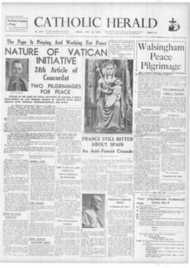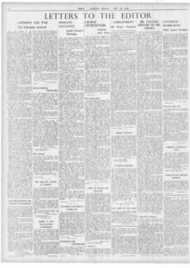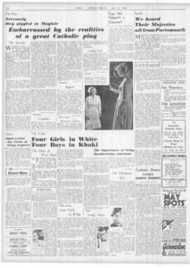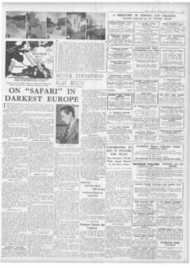Page 13, 12th May 1939
Page 13

Report an error
Noticed an error on this page?If you've noticed an error in this article please click here to report it.
Tags
Share
Related articles
African Diary
Fled In Tooth
Vocation On
Public Cinema
Douglas Hyde's1
Pay A Visit To Poland
ON "SAFARI" IN DARKEST EUROPE
IHAVE just returned from safari in Darkest Europe. If you go the right way about things it is possible to meet some Frenchmen in Paris at Easter, but on the whole it's better not to meet them. You can't help feeling as you stroll with the English crowds along the boulevards that the foreigner is a bit of an intruder at such an English festival as Easter in Paris.
And of course Paris is shocking, particularly in its contempt for :A.R.P. Not a trench anywhere, no posters about National Service on the !Arc de Triomphe, or round the dome of the Invalides, no healthy matrons in uniform shouting for soldiers, not even a steel shelter embedded in clay. And a steel shelter doesn't cost much, does it?
These Frenchmen don't take things seriously.
At Kehl, on the wrong side of the 'Thine (or the right side if you don't like Mr Belloc) there was more gravity. But not a. lot more. I wasn't stripped, nor was I interrogated by Prussian officers 6—sorry—ruthless Prussian officers. The Old man with the profuse white moustache who examined my money was fatherly.
NOT APPRECIATED They had all the flags out in Baden Baden, including the Union Jack; but the American and English and French were not there to appreciate the bright compliments.
There are not many foreigners this year in Baden-Baden, they're cross with the Fuehrer for leading them up the garden; but Germans still drink the disgusting water that's supposed to make mother look like daughter.
In a village near the Spa I met several friends. They were less sure of themselves than they had been in summer. The Czech business: " We've got the Skoda works, but nine million Czechs also. Anyway, who gains? No one in the village is any richer."
They were sick of the threat of war, sick of the eternal regimentation, sick of the newspapers.
Said a nurse: " I have not read the newspapers for a week. It is always the same thing—CRISIS. When is it all going to end?" She talked, too, of shortage of labour, and shortage of visitors. I hear, by the way, that hotel keepers are chanting these days: "One Fuehrer, one Reich, one Visitor."
THEY HATED IT
Some of the conscripts I met were Very discontented. Of course, no conscripts anywhere, except a few fanatics,. love their conscription. But these conscripts hated it violently. There was no time for the conscript to think, no time for them to be anything but a number in a machine, and to be used as impersonally as the part of a machine-gun. "Some nights we are so tired that we have to pull each other Up the stairs in the barracks."
The day I left a conscript said: " You know it isn't much that a young man has to live for these days."
On the way to the station we passed Members of the Hitler Jugend marching round a flag pole. They marched seriously and efficiently. The taxi driver put bis finger to his forehead. " Ga Ga!" be said simply.
ACROSS THE ALPS
The journey across the Alps from Bale to Chiasso is very beautiful—but Trot when one travels at night, wooden class. Still, they give you good meals In the Italian trains, so Rome at halfpast three on a hot afternoon seemed enchanting, even though all the hotels were full. Possibly the Grand Hotel, where Marshal Goering was staying, wasn't full, but somehow the sight of so many flags, soldiers, commissionaires, and messenger boys on red motor-cycles, all ready to scorch to Berlin on the slightest provocation, made me shy, So I went instead to a Swiss pension, where there were no messenger boys on motorcycles, but a lot of Germans.
Everywhere there were a lot of Germans. They were not popular with the Romans because they did not take taxis nor did they tip on the American or English scales. Most of them probably hadn't money for taxis or tips. They were proletarians out on a rather elaborate beano. A woman from Vienna —not a refugee, she insisted—who BEAUMONT COLLEGE ENTRANCE SCHOLARSHIPS
SCHOLARSHIPS are awarded in March and June. Candidates must have taken previously the March or June Common Entrance Examination. A turther Examination will be bald at the College on March 31st and June 30th.
For furtoer particulars apply the Rector, Beaumont College, Old Windsor, Berke,
talked of the pleasure of committing suicide, pointed at a crowd of the Germans scornfully. " Two years ago they didn't know where Rome was, now they're here. They fill the place."
I thought it rather wonderful that they should be able to come to the first city of Christendom, and see the power and the splendour and the holiness of the Universal Church, and hear the Negro and the Chinaman and the Jew singing prayers with the people of the European lands.
But she talked more of suicide. The orchestra of the café in which we sat played pieces of Manors Lescaut.
SOLDIERS EVERYWHERE
In every street I saw soldiers. Officers in comic opera brilliance, conscripts in much worn drabness. One morning the conscripts brushed their jackets and the officers had their medals polished, and they all went together to the hideous wedding cake excrescence, called the Victor Emmanuel memorial, to watch the Hungarian Prime Minister lay a wreath on the Unknown Warrior's tomb. He came in an open motor-ear, the Hungarian Prime Minister, escorted by men on motor-cycles. As he walked up the interminable white steps a band began to play the Rakoczy March, after a little while the music turned into the Hungarian national anthem, then into the Fascist anthem, and at last the Italian national anthem. But the Hungarian Prime Minister had not reached the top of the steps, so the band played all the tunes again.
The small crowd watching clapped hands as the wreath on the tomb was laid.
BROKEN PLEDGE
After Rome my ticket said to Albania, but it seemed as well before attempting to go there to find out what the Italian authorities said. They didn't say anything for three days, except that they didn't know. One of the places where one went to try and supplement the vagueness of the Italian authorities was the American Express. The place was full of American women—middle-aged and dressed to go with wide lawns and tea in porcelain cups—booking passages home to U.S.A. They were pleasant people at the American Express, but they didn't know.
Eventually the Italian Foreign Office did know. It was perfectly all right for anyone with an English passport to go to Albania, no special visa was needed. So I went.
At Brindisi the boat had been delayed a day, but there was a night boat from Bari.
At Bari one waited until night. there had been trouble over a railway ticket. Much trouble. Altogether there had been seven officials involved. One's ticket had not been valid. They had been charming but one had had to pay full fare. In Bari one waited. The shops were closed, it was a holiday, a Fascist celebration. In Brindisi there had been a band in the street and the people had gathered in small crowds and sung. But here in Bari they just walked about, or sat in cafés from which radios blared. At ten I embarked. At ten-thirty I was turned off. I passed customs, and my passport met with approval from everyone until the police came aboard just to give the passengers a final look over. I wasn't approved. No foreigners could enter Albania.
Dismally I found myself a hotel.
POLICE INSTRUCTIONS
The next morning after going to the police, to the military headquarters, and back to the police it seemed that besides not being able to go to Albania, I could not embark on any ship which called at Durazzo—the Albanian port— even though I promised not to go ashore but to stay on the ship until the shores of Jugoslavia were reached.
Bari is interesting perhaps for two hours. But two days ....
The second afternoon there I walked along the shore to the outskirts of the town. On some waste land young men were playing bowls. A wine-seller put tables and chairs on the edge of the hummocky bowling green. I sat down and watched some brilliant throwing. An old man sat down beside me. He asked if I were American. He had been in America for twenty-six years, now he had come back to Italy, and was very happy.
He was a man of property now. He repeated that several times. But there was much to pay in taxes. This Albanian business would cost people like him quite a lot. As he spoke some military 'planes flew above us and out across the Adriatic. The Italians were happy people, were they not ? Here came a train. Were the trains in England so fast?
Back along the sea front I walked. A troop of the Balilla were marching up and down to the whistle of an army officer with a severe frown and pincenez. They were very young most of the troop, and did not keep in step. They wore their cloaks rolled up and slung across their shoulders, like small blankets. At one end of the sea walk an officer with many medals on his breast, and some children playing by his feet, waited to review his child troops.
There were many hundreds of soldiers in the town, and mules. The soldiers didn't like the mules, and the mules were apathetic about the soldiers.
JOYOUS CHILDREN In the alleys near the harbour there was the high. joyous noise of children playing. All the narrow streets were full of children, and outside the doors of the tall houses sat the mothers of these children gossiping, singing, giving milk to their babies, sewing.... Bari was bursting untidily with life here in the whitewashed jungle of slums.
I took boat from Bari direct to Trieste and Venice. There was a young Italian on the boat going home to Egypt after some years in Milan. He said he had left Egypt because of the political situation. He wanted to go to London. They built houses of brick in London, didn't they. It would be interesting. "But these politics.... " Why can't all the nations of Europe live together in peace? Why can't Europe be united? Why must the countries conscript all their young men for the army? Why must they go on arming and arming and arming?"
He was bitter and contemptuous about the Jews. They were not European. He did not think much of Arabs either. " The English ought not to have abandoned Egypt. The people there can't rule themselves. They have the minds of children—nasty children."
The sun shone all day, and the Adriatic was as blue as the sea on a railway poster. It seemed a pity to talk politics. But one did. One talked architecture also, and food and art.
VENICE—MORE GERMANS
Venice, which is just as every lovesick schoolgirl of Philadelphia, Pa., imagines it, had no foreigners in it except some Germans.
Among the Germans at my hotel was a doctor from Cologne. Almost the first question he asked was: " When do you people in England think that war will come?" Even in Venice, this war that is to come....
I said, not very sincerely at the time, that I did not think there would be war for a year at least. We talked about the madness of the war. and the madness of the preparing for war that was going on all over Europe, and of the dreadful helplessness of the individual.
He agreed that England could not for ever go on giving way to the demands of the dictators unless the demands were thoroughly justified.
"But I think," he said, " that you will give way at least once more, for you do not want war. Perhaps you have given way too easily already. We in Germany know that the English people do not want war, and we don't want war, nor do the people in France. But here in Italy it is different. I have spoken to many young men and they are very bellicose."
At the same hotel was a young German woman who had been living with an English family in Greece. The English family had been friends with some Jews, and she had, too—until she received a warning that her German passport might be cancelled unless she promised never to associate with the Jews again. She was returning to her country full of apprehension. In Greece some of the German colony had talked knowingly of concentration camps.
On the feast of St. Mark soldiers filled the city. The King of Italy came and was applauded, and flew away again. The soldiers stayed to listen to the band in the Piazza San Marco.
I left by train.
SWITZERLAND
In Switzerland it was raining. You could not see the Savoy Alps on the other side of the lake at Lausanne. It .was grey and the rain was interminable. People were cheerful, particularly when talking to me. England had conscription, That would sober the Germans. Perhaps the traps for the tanks would not be needed after all, perhaps the explosives could be taken from the bridges.
But during my last evening in the city notice came to my friends about the need of rationing. They were not worried. They played Mozart records on the gramophone. There were guns all along the frontier. Hitler, Daladier and Chamberlain were all emphasising their firmness, their newspapers were being grave on the leader page, but eine kleine naclititsusik made these realities childish, FRANCE A LITTLE GRIMMER I slept all the way to Paris peacefully, except for the interruption of the Customs officers at Vallorbe. A man in the next carriage had a lot of cheeses. Too many, for, in spite of protest, duty was charged. There was the murmur of officialdom all down the train. I turned off the light. At Gare de Lyon they had painted the roof deep blue.
Perhaps, after all, those Frenchmen were taking things seriously.
blog comments powered by Disqus

















